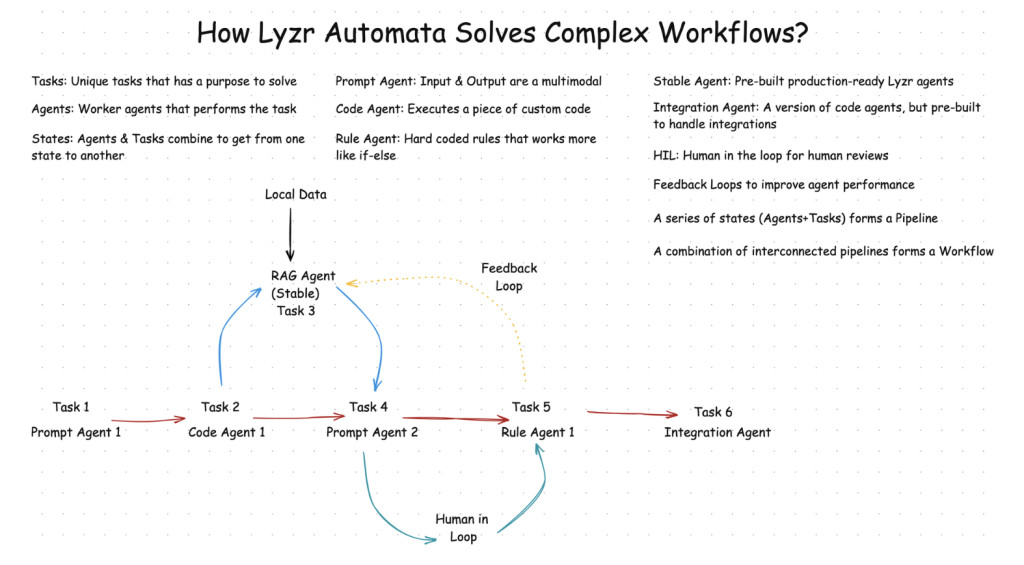LyzrCore introduces  Lyzr Automata, which represents a significant advancement in the field of process automation, offering a low-code multi-agent framework designed to streamline complex workflows. At its core, the system incorporates a sophisticated Human-in-Loop mechanism, enabling users to guide agent behavior through predefined rules. This innovative approach utilizes a rule-based agent to verify the conformity of actions and outputs to user-specified parameters. The framework’s adaptive learning capability is enhanced by storing the results of these conformity checks in a database, which is subsequently queried by a Retrieval-Augmented Generation (RAG) agent in future executions. This iterative process significantly reduces rule violations and minimizes errors by learning from previous interactions.
It is important to note that Lyzr Automata was initially developed as an experimental project, which may have resulted in some preliminary imperfections. However, the development team is deeply committed to refining the framework’s stability and structure in forthcoming releases, with the ultimate goal of delivering a high-quality, robust automation solution. In the spirit of collaborative innovation, the creators actively encourage contributions from the wider community, fostering an environment of shared progress and collective advancement of the project’s capabilities.
Lyzr Automata stands as an innovative autonomous multi-agent framework tailored for advanced process automation. This sophisticated system is engineered with a primary focus on simplifying complex workflows while maximizing efficiency and effectiveness. The framework’s architecture facilitates the creation and deployment of multiple specialized agents, each intricately coupled with specific tasks.
A key feature of Lyzr Automata is its ability to enable these agents and tasks to operate independently, executing provided instructions to achieve a stable operational state.
To maintain clarity and ease of use, the framework is structured around five fundamental building blocks:
1. Models
2. Agents
3. Tools
4. Tasks
5. Pipelines
This modular approach allows for a more intuitive understanding and implementation of the framework, enabling users to seamlessly integrate and customize each component according to their specific automation requirements. By deconstructing the framework into these essential elements, Lyzr Automata provides a flexible and scalable solution for a wide range of automation challenges across various industries and applications.
Models form the core unit of the Lyzr Automata framework, facilitating the integration of various LLMs and AI models into automation workflows. The framework offers pre-built model classes for popular services such as OpenAI and Perplexity, enhancing accessibility. Also, users can extend the base AIModel class to incorporate support for custom models, providing flexibility in implementation and expanding the framework’s capabilities to suit diverse automation needs.
Agents in the Lyzr Automata framework function as specialized entities, each equipped with a defined role, persona, and memory capacity. These agents are designed to provide direction and expertise to LLMs, thereby enhancing their effectiveness in executing specific tasks within the automation workflow. By utilizing these directed specialists, the framework ensures more accurate and context-appropriate responses from the underlying AI models.
Within the Lyzr Automata framework, Tools serve as critical components that enable Agents to accomplish their assigned tasks effectively. These Tools function as interfaces, facilitating connections between agents and external software components such as APIs or other functional modules. This integration capability significantly expands the scope and versatility of the automation processes.
The framework offers a range of pre-built tools for immediate use, as well as compatibility with tools from third-party providers like Llama Hub, enhancing its extensibility. For more specialized requirements, users can utilize the base Tool class to create custom tools. This customization process involves defining the tool’s function, along with its input and output parameters using Pydantic models, ensuring type safety and data validation.
Tasks in the Lyzr Automata framework represent the smallest operational units, defining specific actions to be performed by agents. These atomic elements effectively combine agents and tools, encapsulating the precise objectives to be accomplished within the automation workflow. By integrating agent capabilities with appropriate tools, tasks provide a clear and concise definition of the desired outcomes in the automation process.
Pipelines in the Lyzr Automata framework orchestrate the execution of tasks in a structured and sequential manner. The current implementation supports linear asynchronous pipelines, allowing for efficient processing of tasks in a predetermined order. Looking ahead, the development team plans to introduce asynchronous Directed Acyclic Graph (DAG) pipelines in future releases, which will enable more complex and flexible workflow configurations.
Code
Flow
This study introduces Lyzr Automata, an innovative low-code multi-agent framework for process automation. It features a Human-in-Loop mechanism and adaptive learning through a rule-based agent and RAG system. The framework consists of five key components: Models, Agents, Tools, Tasks, and Pipelines. Models integrate various LLMs, while Agents act as specialized entities with defined roles. Tools connect agents to external software, and Tasks combine agents and tools to define specific actions. Pipelines orchestrate task execution sequentially. Though initially experimental, Lyzr Automata aims to streamline complex workflows and encourages community contributions for further development and refinement.
The post Lyzr Automata: A Low-Code Multi-Agent Framework for Advanced Process Automation appeared first on MarkTechPost.
Source: Read MoreÂ

